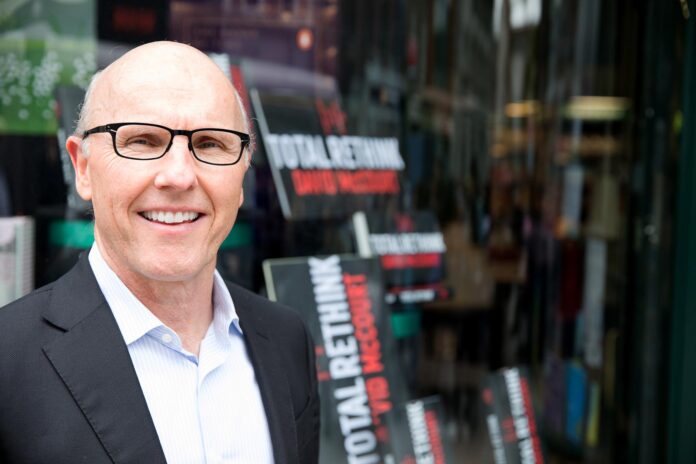HE’S A self made multi-millionaire who is leading one of the country’s biggest infrastructure projects, but when one speaks to David McCourt it’s apparent he’s not solely interested in the issues faced by the 1%.
Mr McCourt is chairman of National Broadband Ireland (NBI) and when he talks about connecting the country, it’s very clear that he’s interested in its potential for redressing rural-urban imbalance, taking the sting out of the runaway property market, and saving villages from a death spiral.
The Tradaree building in Newmarket on Fergus hosted a board meeting of NBI last week, and Mr McCourt said he wanted to give a message to those attending.
“This is to demonstrate to my board that everything needs to be rethought. We’ll have our board dinner in Meals on Wheels, which will be transformed for the night. It’ll be a physical representation of how everything needs to be rethought.
“Meals on Wheels are rethinking food waste, a high percentage of the food they use comes from Foodcloud, food that would have been wasted. It’s all about taking traditional problems and rethinking the solution.”
The world has becoming more urbanised for generations, and it’s still happening at a rate that he believes can’t be sustained, but the provision of rural broadband is a way of halting the problem. “Globally, there are three million people a week born or move into an urban environment. That means every three weeks it’s as if we’re creating another New York or another Hong Kong or another London.
“A lot of it is in Asia or Africa, but it’s all over the world, and it’s totally unsustainable from an infrastructure standpoint, an environment standpoint, roads, schools, cost of housing.
“The reason they’re doing that is because that’s where the opportunity is. If we can put the opportunity where the people are, they don’t have to move to the urban environment.
“That is something that’s hard to do, takes a long time and takes a commitment over a long period of time.
“The Irish government were hugely ambitious when they decided to do the national broadband plan. Now we all have to work together, social enterprise, business, politicians, policy makers, we have to work together and recognise the fibre is only a piece of it.”
While it is ubiquitous nowadays, the internet is still relatively new technology, and its power needs to be harnessed for the common good, he feels.
“In the mid-70s when the internet was invented what cost you a million dollars would cost you a dollar today, any way you want to measure it – capacity, storage, speed, flexibility. That’s the fastest growth of any industry in the history of mankind.
“The next closest example would be transportation; what cost you $10 in the ‘70s would cost you $1 today, if you wanted to move tomatoes from Galway to Dublin or flour from LA to New York. So transportation is ten to one and technology is a million to one.
“Over the next five to ten years it’s going to be another three to five million times more efficient. Technology and software rule the world and we need to use it to solve problems, to employ people, to give people dignity, to help people.”
He speaks passionately about the plight of working people, disenfranchised by rising costs, particularly around housing.
Mr McCourt says that when his own grandfather arrived in America, four in five people lived in rural areas, and a janitor could easily expect to own his own home and raise a family.
“My grandfather cleaned toilets for a living, his wife didn’t work, but he owned his own house, had his own garden in the backyard, his own apple trees, tomatoes, his barbecue in the backyard, he was proud of his house, proud of his job and he paid for my mother to go to school.
“That’s impossible today. No janitor with one income can own a house with a quarter acre lot, pay for the kid to go to school, pay for sneakers and a new winter jacket. That’s unsustainable and it needs to change or otherwise society doesn’t work.”
He was speaking as he launched his own non-profit which aims to help revitalise rural communities, and in general he believes business has not done enough to sustain the very people it relies upon.
“Business people don’t like when I say what I’m about to say, but it’s the truth, and I’m at a stage in life where there’s no reason not to say what you feel.
“Capitalism is under fire around the world for good reason. They’ve gotten too good at extracting profit and not contributing back to the community and they’re too short term thinking.”
He says that two generations ago his grandfather was able to live in some comfort despite a relatively modest income, while he was also able to make upward progress and have a pension.
“Those things have been stripped from society and business hides behind how much value it has created. But value for who?”
Work has to pay enough for people to live in a reasonable way, he insists.
“With a job you should be able to afford a place to live, or something is wrong with society. The answer isn’t let’s tax everyone and give everyone everything for free. That’s not a long term solution.”
Owen Ryan has been a journalist with the Clare Champion since 2007, having previously worked with a number of other publications in Limerick, Cork and Galway. His first book will be published in December 2024.



